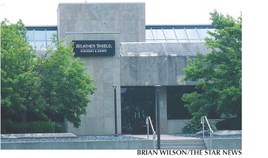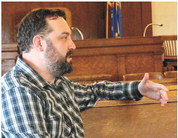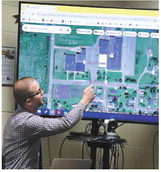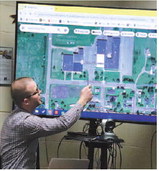Marathon to consider robust road program


Trustees evaluate various financing mechanisms
The Village of Marathon City Board last week Wednesday directed administrator Andy Kurtz to research possibly borrowing money to finance a $2.15 million five-year street plan. In an extensive discussion, Kurtz told board members that the $80,000 the village budgets annually for street work is insufficient, and, with nowhere in the budget to cut, the village has no choice but to borrow money in order to whittle down its list of needed roar repair projects.
“Ultimately, we have to come to the realization that we can’t do this for $80,000 a year,” he said.
Kurtz and board members discussed the “budget gap” for street maintenance and touched on various ways to raise revenues, including a property tax increase, a wheel tax and funding through a transportation utility that could, possibly, tax the large fleet of trucks owned and operated by Marathon City companies. Trustees discussed possibly floating a referendum to raise tax money dedicated for street work.
No decisions were reached, but, rather than turn down Kurtz’s suggestion, trustees agreed to have him get borrowing projections from Ehlers Associates and to see if local blacktop paver, American Asphalt, Mosinee, would be willing to “lock-in” prices for projects that could be scheduled over the next several years. They agreed to talk further with Kurtz at a meeting to be held this week.
The impetus for the special meeting was Kurtz asking trustees whether they could support repaving First Street, East to Main Streets, this year, rather than keeping it in a five-year street plan to be done in 2022. The street’s water utility main exploded earlier this year, damaging a large stretch of blacktop. The village’s water utility will share the cost of the repair. Cost of the repaving is $101,400.
The First Street project discussion, however, opened up a wider “difficult conversation” about how the village can, in general, pay for future street repair.
Kurtz said paying for a $2.15 million street plan over five years could possibly cost homeowners an additional $50 to $75 in property taxes on a $100,000 house, but suggested that the village could repurpose the current $130,000 a year loan payment for the Marathon Fire Station for streetwork after the loan is paid off in 2024-25 to lessen the tax impact of a more aggressive streets program.
Kurtz said the state government “squeezes” the village with levy limits and declining state shared revenues which make street repair impossible to pay for. He said the village has not attempted a major street repair project for a decade and that other village departments have seen only minor cost of living increases over the years.
Board members had different reactions to Kurtz’s street proposal.
Trustee Mark Ahrens said he was generally opposed to borrowing money for streets and, instead, preferred to increase the streets budget in order to pay for needed repairs with cash.
“I don’t want to borrow my way out of this,” he said.
Ahrens suggested using American Rescue Act money for street repair, but administrator Kurtz said contractor prices would likely soar once that money is allocated. He said it was not certain what the federal money will be able to be used for.
Village president Dave Bellanger said it was preferable to borrow money now for streetwork since interest rates are low and, predictably, the cost of street repair will only go up in the next few years. He pushed Kurtz to see if American Asphalt would be willing to “lockin” street repair prices for a multi-year schedule of work.
Trustee Janine McCain asked if the village could press the Department of Revenue (DOR) to correct the village’s state shared revenue payment and use the extra money for streets. Kurtz said he did not want to press the DOR at the same time the village is asking Sen. Jerry Petrowski (R-Marathon) to pass Tax Incremental Finance (TIF) legislation.
Trustee Keith Paul said he saw value in considering a wheel tax. He said the $25 county wheel tax had helped Marathon County keep local highways in good shape. It was estimated that a similar tax in Marathon City might raise $25,000. This was not enough money to pay for a street repair initiative, it was said, but it was money that could offset a property tax increase.
In other discussion, board members suggested sending out a village survey to gauge public interest in borrowing to pay for a large street repair initiative.
Trustees said that they were nervous about raising property taxes to pay for a more robust five-year street plan. Administrator Kurtz said any tax increase would likely be overshadowed by taxes charged by Marathon County and Marathon School District.
Still, he said he was reluctant to suggest borrowing money to supplement the current streets budget and get current on needed road repair.
“I don’t want to do it,” he said. “But it’s the only thing we can do. For us to catch up, we have to leapfrog and that’s what this is.”

Andy Kurtz





